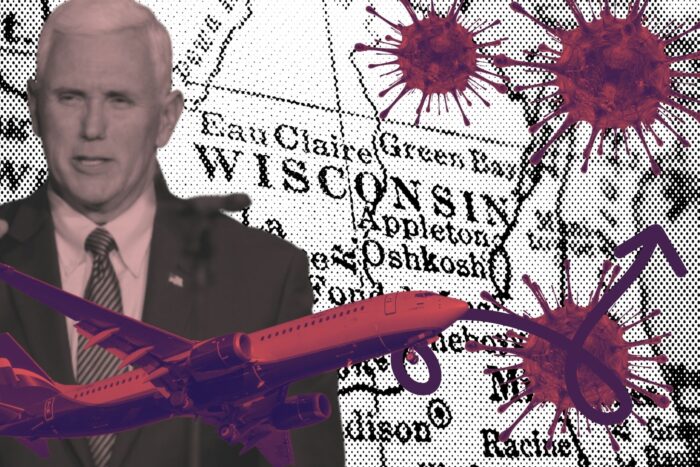In April 2020, as the Covid-19 pandemic took hold of the country, Wisconsin reported hundreds of new coronavirus cases every week. At the time, medical staff were in dire need of personal protective equipment, with more than half of the state’s hospitals, including those in heavily populated areas like Milwaukee, reporting that they had less than a week’s worth of supplies left. Documents recently obtained by American Oversight show Wisconsin state officials struggled during this time to get adequate federal support, and also shed light on plans for trips to the state by Vice President Mike Pence.
On March 13, Maggie Gau, chief of staff of Wisconsin Gov. Tony Evers, wrote to U.S. Health and Human Services official Darcie Johnston about Wisconsin residents who had been aboard the Grand Princess cruise ship, an early site of a Covid-19 outbreak. Johnston said that Wisconsin health department officials “have had minimal contact with HHS staff, often times with conflicting answers.” She further wrote that there were concerns that the passengers being quarantined, many of whom were elderly, lacked access to crucial medications, toiletries, and personal belongings. Johnston said the passengers would receive necessities, but Gau had to follow up repeatedly to confirm that prescriptions would be filled.
Wisconsin officials also spent months attempting to get adequate personal protective equipment from federal officials. On April 20, Gau replied to a White House document touting the successes of Project Airbridge, the White House-led push to distribute and deliver medical supplies. Writing to Tucker Obenshain, a staffer in Vice President Mike Pence’s office, Gau said, “It is frustrating and disingenuous to assert that millions of PPE supplies are being delivered to the State of Wisconsin when we have not received the supplies we have repeatedly requested.”
The next month, Gau repeatedly requested help from federal officials in addressing a severe shortage of medical gowns. On May 5, she wrote to Nic Pottebaum, then a special assistant to the president, and Zachariah Swint, the associate director in the White House’s Office of Intergovernmental Affairs, saying, “We have made requests for gowns to FEMA beginning on March 31 and unfortunately FEMA has not been able to provide gowns to Wisconsin. We currently have unfilled requests for 276,631 gowns.” More than a week later, Gau re-upped the request, writing that the state only had a 10-day supply of gowns left.
Months later, the state was still in need of protective equipment. On Aug. 6, Gov. Evers wrote to Kevin Sligh, the regional administrator of the Federal Emergency Management Agency: “Wisconsin continues to experience critical shortages of gowns, gloves, and N95 respirators. This shortage was recently exacerbated when some nursing homes reported that the PPE received from FEMA was substandard and could not be used. […] I am requesting that you expedite Wisconsin’s outstanding PPE requests, which include approximately 3.6 million gloves, 260,000 gowns, and 200,000 N95 respirators.”
 Vice President Pence’s Wisconsin Trips
Vice President Pence’s Wisconsin Trips
As Wisconsin officials pleaded for help, the White House was planning events in the state that did not meet public health guidelines. On May 15, Obenshain followed up on a conversation in which she had informed Gau that Pence was considering visiting the state that month. Gau replied that “this event would be outside of our current recommendations to the public” and asked whether social-distancing measures would be followed and whether all attendees would be required to wear masks and gloves — including Pence and the Secret Service.
In the end, the trip appears to have been canceled. But a month later, on June 23, Pence visited Waukesha County as part of the president’s re-election campaign, attending an event that went against local health guidelines. At the time, there were more than 1,000 confirmed Covid-19 cases in Waukesha County and county health officials were advising residents to avoid gatherings of more than 100 people.
American Oversight obtained additional documents that included an email from County Executive Paul Farrow to Kirsten Schmidt, the deputy state director at Wisconsin Trump Victory, sent in advance of Pence’s visit. In the email, dated June 15, Farrow referenced the county’s policy recommending that large gatherings be limited to fewer than 100 people, but indicated that the venue would face no punitive action so long as it continued “to follow the health guidelines [it was] already practicing.” He added that “there is no ‘order’ in place for any type of enforcement.”
Armed with the knowledge that the recommended 100-person limit would not be enforced, the Trump campaign went ahead and held a large indoor event, with seating for at least 200 attendees in the main ballroom and at least 150 in an overflow room. Attendees were required to sign waivers agreeing not to hold the campaign liable if they contracted the coronavirus.
In the weeks after the rally, Waukesha County’s daily reported positive case count continued to rise, and the county’s total number of reported coronavirus cases doubled in July. American Oversight has previously reported on the Trump campaign’s reckless approach to other events, including the indoor rally in Tulsa, Okla., last June that public health officials warned would directly cause multiple deaths.
The Trump administration’s poor coordination with state governments on the handling of the pandemic was also seen in other records obtained by American Oversight that, like the emails from Wisconsin officials, revealed Illinois officials’ deep frustration with the White House in the spring of 2020.
